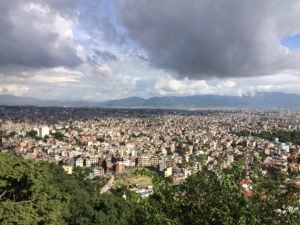Dear Mr. President
The following is a post I wrote on March 25 in the form of a letter to our president, Mr. Donald Trump, to work through the issues that emerged after hearing him tease the country with using Easter Sunday as a visual symbol for America’s return to a supposed normalcy. I have been almost completely silent from this Pedal Pilgrim site since I took an executive position with the Presbytery of the Cascades. My voice in the presbytery has evolved over the last 30 months to the point where I believe what I say there can also be said here. If you want to follow me directly please subscribe at www.holybreadcrumbs.org.Here is the letter that went viral last week:
Dear Mr. President,
I felt the need to write you at this critical juncture as we Americans come together as a nation to fight the deadly coronavirus. I was disturbed on Monday when you telegraphed your hopes that America would return to normal and that Easter services could be packed on April 12. You said that you thought “this would be a beautiful time.”The same day that you were hinting that we were coming out the other side of this, our presbytery was informing the people of our churches in our jurisdiction to go into quarantine. We set a tone that it was time to physically, emotionally and spiritually prepare to settle in for a protracted period until further notice. Your premature hopeful tone clashed with our “batten down the hatches” tone.
I appreciate your desire to get back to normal as quickly as possible. I don’t think anyone wants to stretch this even one hour longer than necessary. But I am deeply disturbed that you have ignored all of the scientific evidence in order to use Easter services purely as an optic. It makes for great TV. It’s a “beautiful” plot line for a movie script. Movie scripts have a deep impact on people’s imaginations, but they have no impact on a fast-moving, deadly virus. There is a reason that we have science and the arts. It is imperative that we don’t confuse the two right now. There are life and death consequences to the decisions that we make in this time.
I write to you as one who has been a religious professional for over thirty years. I have been a local pastor for much of that time and now serve as the executive of a region of churches in the Pacific Northwest. Easter is what we call a “high holy day” in the church. I can see that you recognize that as you imagine how beautiful it would be to have our sanctuaries once again packed with millions of Christians on this special Sunday. I admit that it would make for a tear-jerker, 60 Minutes Special that night.
But for us, Easter is not just a Sunday. It is a lived reality. As one of our pastors, the Rev. Dr. David Hutchinson, posted this morning, we are “Waiting for Easter” this year and Easter will be the first Sunday we are back face to face and singing “Jesus Christ is Risen Today.” Lent and Good Friday are just going to last a little longer than we expected.
You see, Mr. President, Easter for us is not a specific date. It’s a lived experience and a season of life. Easter will not be on April 12, Mr. President. Easter this year will be when grandparents can once again hug their grandchildren. Easter will be when we accidentally brush up against a neighbor and say, “excuse me” instead of shuddering in fear. Easter will be when it once again becomes normal to sit next to each other at high school basketball games, concerts on the grass, and in a cozy theater. Easter will be when we step aside and let the elderly woman get the last package of toilet paper on the shelf. Easter will be when our doctors and nurses don’t have worry that they might die just for doing their jobs. Easter will be when we toast each other at our favorite pub or bar.
I am disturbed, Mr. President, because your voice and your office hold incredible weight. In fact, you may have the most powerful pulpit in the whole world and billions of people depend on what you say and what decisions you make. I am disturbed because you have put me in a very awkward position. I also hold a position of authority, not nearly to the degree you do, but I have 96 churches, hundreds of pastors and nearly 14,000 members who take my recommendations seriously. Our presbytery has recommended that we hold no in-person worship until further notice. With only one notable exception, there is no medical expert or government official who is indicating that the worst is over and that we can start preparing for a beautiful Easter Sunday. Mr. President, you are that one lone voice who is not in touch with reality.
I am disturbed, Mr. President, because those of us in leadership positions have to make recommendations to our churches and their pastors in this time. They want to know, “Do we continue to worship online or should we be following the President’s lead on this and start preparing for Easter celebrations?” I am disturbed, Mr. President, because you leave me no choice. I must recommend that our churches continue to remain closed to in-person gatherings until medical experts and our own city, county and state governments lift restrictions. If I am asked why I am not taking my cues from the overly hopeful tone that you have set I will have to be honest: “I am sorry, but I do not trust our president to have the judgment to keep us safe, to be honest with us, and do what is right for our country.”I wished it weren’t so, Mr. President. I do not relish the thought of crossing the man who is considered to be the most powerful person in the world. But there are thousands, hundreds of thousands, and potentially millions of people’s lives that are on the line, depending on the decisions that you and I make. I can live with defying you. I can’t live with the thought of thousands of people dying for a staged “beautiful Easter Sunday” made for Sunday night television.
Mr. President, I can promise you that Easter will come!
It just won’t be on April 12 this year.
By Rev. Brian Heron,
Pedal Pilgrim and Presbyter for Vision and Mission, Presbytery of the Cascades
Experience First, Process Later
I remember a good friend six years ago asking while I was on my pulgrimage through the West if I was going to unplug for a period and just experience the pilgrimage without the need to blog daily changing the lens that I used and thus changing the rxperience. I knew there was wisdom in her suggestion even though I remained committed to inviting people into the rawness of my daily experience. And while I knew that was the right thing then I also knew that that cimmitment chsnged my experience. I remember many days when I was already writing the blog in my head as I rode. Rather than just experiencing a dramatic thunder and lighting storm my mind was already shaping the narrative before the had even stopped.
The view of Karhmandu from the rooftop cafe at the Hindu Monkey Temple.
I am going to do it differently this time. Of course I had to be slightly coerced into it. I confirmed two weeks ago that internet and cell coverage will be very spotty and should expect only 3-4 places where blogging could even br possible. Many days we will just be camped alongside the road as we make the 12-day trek up to Everest Base Camp.
I do want to share this journey with you, but I have committed to protecting the experience of it first and processing and sharing it only second.If you want more regular updates please make a friend request on Facebook. I am likely to post a few pictures there with just a note or two about what I am experiencing.For today let me just share that I wasable to witness a Hindu cremation ceremony on the Bagmati River in Kathmandu. It brought tears to my eyes as I witnessed the family prepare the body, adorn it, carry it to the prepared funeral pyre, and then follow what was obvoously a prescribed funeral ritual before lighting the wood on fire. Most folks stood by reverently as they said goodbye to this friend/ loved one while one woman wailed in the background held by four or five other women who may have been jeld themselves like this at one time.What was especially intriguing was how public this ritual of gratitude, lettong go and mourning was. Three others bodies were lined up obviously awaiting the full community of celebrants/ mourners to arrive. Hundreds of people--tourists, locals, religious adherents and who knows who else milled about as if this was just another day to come to market.Life went on. Bodies were burned. Beggars begged. Tourists snspped pictures. Monkets fought over scraps and death was just another part of another day in a long series of days and years that ends scattered in the womb of the river just as it begins in the mother's womb.äBike is still not here. I am becoming less philosophical about it and more annoyed as I set off tomorrow on a borrowed bike with only half the gear I planned for and wearing the same increasingly stinky socks for the fourth day in a row.My six other cycling friends have offered to share gear to get me through the next couple of days including a vivid pink jersey from one young woman. I might have to learn to accept help. Geez! Climbing Everest is easy. Accepting help? Now that's going to be the resl challenge!Complicated, unpredictable journey ahead. I'll post, but only when technology, space, schedule and mood allow. Experience first. Process later.
Two Worlds, One Job!
Between two worlds... Between two worlds...If you have followed my blog for any length of time you will have seen this nagging theme of “between two worlds” threading itself through much of my writing. In fact, during Lent of 2016 I wrote a whole 40-day blog series under this title (it was actually only 39 blogs since I was just too tired one day. An almost perfect Lenten discipline!).Two days ago the unthinkable happened.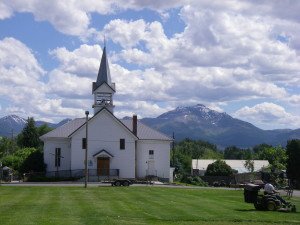 My two worlds were invited to come together. I just accepted a position with the Presbytery of the Cascades (the 97-church district that covers Western Oregon and a small slice of Southern Washington and Northern California) to become the Presbyter for Vision and Mission. To the outside world the language may sound clunky, but essentially it is the head of staff executive position in charge of seeing the church through the next few years of deepening our mission and creating a unified vision that will pull our congregations forward for the next generation or so.It is a sobering position given the general decline of our mainline Protestant denominations and the shifting patterns around religious affiliation and loyalty. But more than that, it represents the engagement of my two worlds that have often been awkward dance partners in my professional life. As I have described in the past I have often felt like I have one foot squarely planted in the life, the rhythm and the rituals of the church and the other foot planted in the secular spirituality of our communities where the Sacred can be found just as easily out on the hiking trail, waist deep in the river, or with a coffee cup and a Sunday paper in hand at an bustling outdoor café.
My two worlds were invited to come together. I just accepted a position with the Presbytery of the Cascades (the 97-church district that covers Western Oregon and a small slice of Southern Washington and Northern California) to become the Presbyter for Vision and Mission. To the outside world the language may sound clunky, but essentially it is the head of staff executive position in charge of seeing the church through the next few years of deepening our mission and creating a unified vision that will pull our congregations forward for the next generation or so.It is a sobering position given the general decline of our mainline Protestant denominations and the shifting patterns around religious affiliation and loyalty. But more than that, it represents the engagement of my two worlds that have often been awkward dance partners in my professional life. As I have described in the past I have often felt like I have one foot squarely planted in the life, the rhythm and the rituals of the church and the other foot planted in the secular spirituality of our communities where the Sacred can be found just as easily out on the hiking trail, waist deep in the river, or with a coffee cup and a Sunday paper in hand at an bustling outdoor café. For years I have either felt this need to choose one or the other or bring them together at the risk of alienating myself from both communities. It happens all the time. If I try to make room in the church for the nature-loving spiritualist who trades out the name of God for the concept of the Sacred I get puzzled looks and questions like, “I certainly respect their brand of faith, but what does that have to do with church?” And if I let slip too early that I happen to be a minister with my hiking, biking, snow-shoeing buddies I can feel the air suddenly grow cold between us as if I had a bad case of garlic breath.But this new position gives me the opportunity to bring these two worlds together. In fact that is what I am supposed to do. Last year our presbytery had a net loss of 5.8% and 850 members. Unfortunately that pattern has been going on for many years and seems to be picking up speed. I think the Presbyterian Church is finally ready to acknowledge that our future is not in doing church better but is in understanding the spiritual needs and lives of those whose closest association with church is admiring the stained glass windows while walking their dog across the street.I know that there were many reasons for my selection as the new Presbyter ("Executive" in secular terms). Among them my broad range of experiences as a minister including interim positions, new church development, legacy/closure work, and solo pastorates. I also co-moderated the East Portland Vision Plan, a 25-year plan for the quarter million people in East Portland, to improve infrastructure, the economy, parks, bike lanes, traffic patterns, community-building and political clout.
For years I have either felt this need to choose one or the other or bring them together at the risk of alienating myself from both communities. It happens all the time. If I try to make room in the church for the nature-loving spiritualist who trades out the name of God for the concept of the Sacred I get puzzled looks and questions like, “I certainly respect their brand of faith, but what does that have to do with church?” And if I let slip too early that I happen to be a minister with my hiking, biking, snow-shoeing buddies I can feel the air suddenly grow cold between us as if I had a bad case of garlic breath.But this new position gives me the opportunity to bring these two worlds together. In fact that is what I am supposed to do. Last year our presbytery had a net loss of 5.8% and 850 members. Unfortunately that pattern has been going on for many years and seems to be picking up speed. I think the Presbyterian Church is finally ready to acknowledge that our future is not in doing church better but is in understanding the spiritual needs and lives of those whose closest association with church is admiring the stained glass windows while walking their dog across the street.I know that there were many reasons for my selection as the new Presbyter ("Executive" in secular terms). Among them my broad range of experiences as a minister including interim positions, new church development, legacy/closure work, and solo pastorates. I also co-moderated the East Portland Vision Plan, a 25-year plan for the quarter million people in East Portland, to improve infrastructure, the economy, parks, bike lanes, traffic patterns, community-building and political clout.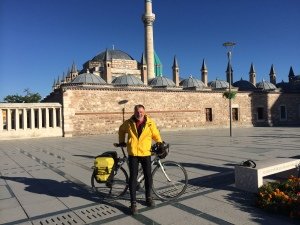 But I believe a big part of this invitation is that for years I have lived in the awkward space between two worlds, between the rich historic traditions of the church and the experimental spiritualities emerging in our communities. Quite honestly it would have been easier on my mental health and pocket book to have settled into one or the other rather than to straddle two worlds, but my love of both left me no choice but live in the space between. The sacrifices, the occasional suspicions and the months on food stamps were all worth it.I do know that this invitation to lead the Presbytery is no perfect and final panacea. It will still be a struggle to introduce these different worlds to each other and get them to find common ground and learn to trust and enjoy each other. There will still be initial suspicion and awkwardness. This is not like winning the lottery, but more like finally being accepted to race the Boston Marathon. It's not a magic pill, but the terrain has changed. What has changed is now my livelihood is based on building those bridges whereas before I risked my livelihood in my attempts to build those bridges. Now I am rewarded for the risks whereas before I often suffered for the risks. It is, at least in my heart and soul, a monumental shift.I have been writing about my experience of living in two worlds for over five years. Now it is two worlds and one job.Maybe there really is a God!
But I believe a big part of this invitation is that for years I have lived in the awkward space between two worlds, between the rich historic traditions of the church and the experimental spiritualities emerging in our communities. Quite honestly it would have been easier on my mental health and pocket book to have settled into one or the other rather than to straddle two worlds, but my love of both left me no choice but live in the space between. The sacrifices, the occasional suspicions and the months on food stamps were all worth it.I do know that this invitation to lead the Presbytery is no perfect and final panacea. It will still be a struggle to introduce these different worlds to each other and get them to find common ground and learn to trust and enjoy each other. There will still be initial suspicion and awkwardness. This is not like winning the lottery, but more like finally being accepted to race the Boston Marathon. It's not a magic pill, but the terrain has changed. What has changed is now my livelihood is based on building those bridges whereas before I risked my livelihood in my attempts to build those bridges. Now I am rewarded for the risks whereas before I often suffered for the risks. It is, at least in my heart and soul, a monumental shift.I have been writing about my experience of living in two worlds for over five years. Now it is two worlds and one job.Maybe there really is a God!
Mountains and Sanctuaries
I am counting the days now. 18 days until I fly off to Kathmandu, Nepal to join a group of crazy, enthusiastic and hopefully fit cyclists to make an attempt to reach Everest Base Camp on the Tibet side of the border. As I near the day my anticipation grows as well as a feeling of humility for what we are about to embark on.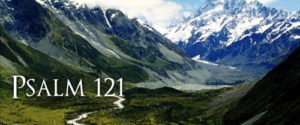 Yesterday I preached a sermon on Psalm 121 with the title "I Lift Up My Eyes to the Hills" which was the original source of this short, but ambitious pilgrimage and writing project. In my preparation I did a little research on the spiritual significance of Mt. Everest to the people who live under her watchful eye. I discovered that the Tibetan name is Chomolungma which means Goddess Mother of the World. In Nepalese the name is Sagarmatha which is translated similarly as Goddess Mother of the Sky.I suddenly gained a whole new appreciation for what we are about to embark on. I knew that I already felt a spiritual pull to climb this mountain on my bike, but the best that I could understand about my motivation was the deeply satisfying feeling of accomplishment that accompanies climbing what is within a few hundred feet of the highest "motorable road in the world." (My original plan was to cycle to Khardung La Pass which reaches another 300 feet in altitude, but that trip was cancelled. Everest Base Camp was not a bad Plan B!).But this week when I discovered that the local Tibetans and Nepalese called Mt. Everest a name that was associated with the "goddess mother" I was suddenly reminded that this is not just an athletic feat, but an invitation by another culture and by the Universe itself to cycle on sacred ground. Mt. Everest is not just a mountain, but the home of the gods and the object of religious and spiritual devotion.
Yesterday I preached a sermon on Psalm 121 with the title "I Lift Up My Eyes to the Hills" which was the original source of this short, but ambitious pilgrimage and writing project. In my preparation I did a little research on the spiritual significance of Mt. Everest to the people who live under her watchful eye. I discovered that the Tibetan name is Chomolungma which means Goddess Mother of the World. In Nepalese the name is Sagarmatha which is translated similarly as Goddess Mother of the Sky.I suddenly gained a whole new appreciation for what we are about to embark on. I knew that I already felt a spiritual pull to climb this mountain on my bike, but the best that I could understand about my motivation was the deeply satisfying feeling of accomplishment that accompanies climbing what is within a few hundred feet of the highest "motorable road in the world." (My original plan was to cycle to Khardung La Pass which reaches another 300 feet in altitude, but that trip was cancelled. Everest Base Camp was not a bad Plan B!).But this week when I discovered that the local Tibetans and Nepalese called Mt. Everest a name that was associated with the "goddess mother" I was suddenly reminded that this is not just an athletic feat, but an invitation by another culture and by the Universe itself to cycle on sacred ground. Mt. Everest is not just a mountain, but the home of the gods and the object of religious and spiritual devotion.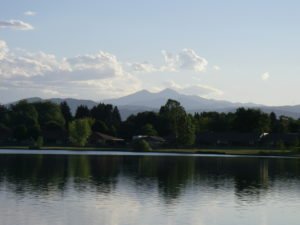 Of course, I should have known that ahead of time. I used to use Long's Peak in Colorado as the object of spontaneous meditations while growing up. Long's Peak was as temperamental as a teenager entering puberty. One day she would be calm and serene. Another day she would be threatening and frighteningly dangerous. But every day was an opportunity to meditate on the personality of the Sacred and the mysterious seasons of Life.All of this got me thinking about those things in our lives that pitch our minds, our hearts and our souls to something deeper, something more mysterious, something divinely beautiful. I am currently working my way through John O'Donohue's book Beauty: Rediscovering the True Sources of Compassion, Serenity, and Hope. He has it broken down into very convenient two to four paragraph sections that make it ideal for my morning meditations.
Of course, I should have known that ahead of time. I used to use Long's Peak in Colorado as the object of spontaneous meditations while growing up. Long's Peak was as temperamental as a teenager entering puberty. One day she would be calm and serene. Another day she would be threatening and frighteningly dangerous. But every day was an opportunity to meditate on the personality of the Sacred and the mysterious seasons of Life.All of this got me thinking about those things in our lives that pitch our minds, our hearts and our souls to something deeper, something more mysterious, something divinely beautiful. I am currently working my way through John O'Donohue's book Beauty: Rediscovering the True Sources of Compassion, Serenity, and Hope. He has it broken down into very convenient two to four paragraph sections that make it ideal for my morning meditations.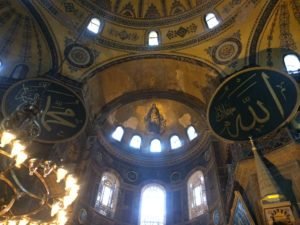 This week he reminded me of the place that houses of worship have played in people's lives for millenia. He wrote of these places as being "sanctuaries of absolute presence". But he grieves that modern people walk and drive by these sanctuaries every day completely unaware of their "divine welcome." He reminded me that at one time communities would raise money for years on end in order to erect a sanctuary in their town. It took years because a real sanctuary wasn't just four walls with movable folding chairs and an all-purpose room that could function as worship space, fellowship hall, gym, and yoga studio. A real sanctuary took thought and intention to create a worshipful atmosphere that pitched the mind, the heart and the soul to that mysterious presence we often call God or the Sacred. High arched ceilings, stained glass windows, and entryways that caused even the most skeptical to feel that they were standing on holy ground as they entered.I realized as I read O'Donohue's reminder of the role that sanctuaries played in our communities at the same time that I was preparing to climb the bottom half of Mt. Everest that I experience a similar invitation in both--that is, the invitation to pitch my mind, my heart and my soul to the deeper mystery of Life.Mountains are sanctuary for me. I can't stare at a magnificently carved mountain without feeling that God Herself (remember Mt. Everest is the Goddess Mother!) is inviting me to dance with her. I can't climb over the ridges and passes without feeling like the mountain is my lover. And I have the same experience in a worship space that is intricately and intentionally designed to draw out my soulful impulses. When the light is just right, the preaching is poetic, the music is heartfelt and the silences are loud that same feeling of awe and intimacy that I feel on with the mountain permeates my soul.
This week he reminded me of the place that houses of worship have played in people's lives for millenia. He wrote of these places as being "sanctuaries of absolute presence". But he grieves that modern people walk and drive by these sanctuaries every day completely unaware of their "divine welcome." He reminded me that at one time communities would raise money for years on end in order to erect a sanctuary in their town. It took years because a real sanctuary wasn't just four walls with movable folding chairs and an all-purpose room that could function as worship space, fellowship hall, gym, and yoga studio. A real sanctuary took thought and intention to create a worshipful atmosphere that pitched the mind, the heart and the soul to that mysterious presence we often call God or the Sacred. High arched ceilings, stained glass windows, and entryways that caused even the most skeptical to feel that they were standing on holy ground as they entered.I realized as I read O'Donohue's reminder of the role that sanctuaries played in our communities at the same time that I was preparing to climb the bottom half of Mt. Everest that I experience a similar invitation in both--that is, the invitation to pitch my mind, my heart and my soul to the deeper mystery of Life.Mountains are sanctuary for me. I can't stare at a magnificently carved mountain without feeling that God Herself (remember Mt. Everest is the Goddess Mother!) is inviting me to dance with her. I can't climb over the ridges and passes without feeling like the mountain is my lover. And I have the same experience in a worship space that is intricately and intentionally designed to draw out my soulful impulses. When the light is just right, the preaching is poetic, the music is heartfelt and the silences are loud that same feeling of awe and intimacy that I feel on with the mountain permeates my soul. I write this as a reminder to myself and others that spiritual worship is not just the domain of the church and any old worship space. Nor is spiritual worship just the domain of the nature purist who is as religious about their Sunday hikes and kayaking adventures as the Sunday faithful who sit in the pews. I think spiritual worship is anything that has the ability to pitch our minds, our hearts and our souls to something deeper, something more mysterious, something divinely beautiful.In eighteen days I will leave for the Goddess Mother of the World--Mt. Everest. I will miss four Sundays of preaching. But I don't think I'll miss a single day of worship. I'll be worshiping with each pedal stroke.I have a good life.
I write this as a reminder to myself and others that spiritual worship is not just the domain of the church and any old worship space. Nor is spiritual worship just the domain of the nature purist who is as religious about their Sunday hikes and kayaking adventures as the Sunday faithful who sit in the pews. I think spiritual worship is anything that has the ability to pitch our minds, our hearts and our souls to something deeper, something more mysterious, something divinely beautiful.In eighteen days I will leave for the Goddess Mother of the World--Mt. Everest. I will miss four Sundays of preaching. But I don't think I'll miss a single day of worship. I'll be worshiping with each pedal stroke.I have a good life.
Everest or Bust!
I have always been a mountain person. I was born in Montana, raised at the foot of the Rockies in Colorado and went to college in Idaho, just a short drive from Bogus Basin ski area. When our young family moved to Wisconsin for my first call in a church we realized that we didn’t fit very well. We chalked up it up to different social norms and cultural expectations. But looking back at it I wonder how much of it was the absence of mountains.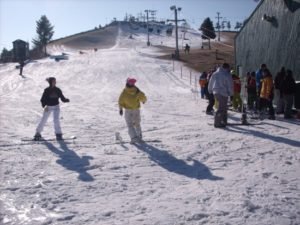 I remember when we were driving up to Milwaukee for some shopping and ahead of me I saw a sign that alerted us to an upcoming ski area. Cross country skiing is a big sport back there, but this sign had stick figure skiers pointed down in the middle of a couple of squiggly lines that were meant to signify a mountain.My jaw dropped.The highest thing I had seen in Wisconsin was an antenna on a fifth story apartment building. But the sign kept its promise and a mile later another sign with the same picture greeted us but this time with an arrow pointing to the left. I quickly went from a gaping open mouth to an exaggerated shaking of my head while zinging out in rapid fire succession, “No! No! No! No!”Right next to the sign that pointed us to the winter playground was another sign pointing the same direction that said, “County landfill.” These Wisconsinites had covered an old landfill with dirt, had installed a rope tow up to the top of the mound of trash and when the snow had covered enough of the pile with the fluffy white stuff they called it a ski area. Stunning!I grew up skiing at Arapahoe Basin in Colorado that takes one up above timberline to nearly 11,000 feet and in Vail with their overpriced lift tickets and celebrity residents. Those were ski areas! I suppose that this mound of dirt in Wisconsin was technically a ski area, but getting the words to fall out of my mouth was nothing less than painful.
I remember when we were driving up to Milwaukee for some shopping and ahead of me I saw a sign that alerted us to an upcoming ski area. Cross country skiing is a big sport back there, but this sign had stick figure skiers pointed down in the middle of a couple of squiggly lines that were meant to signify a mountain.My jaw dropped.The highest thing I had seen in Wisconsin was an antenna on a fifth story apartment building. But the sign kept its promise and a mile later another sign with the same picture greeted us but this time with an arrow pointing to the left. I quickly went from a gaping open mouth to an exaggerated shaking of my head while zinging out in rapid fire succession, “No! No! No! No!”Right next to the sign that pointed us to the winter playground was another sign pointing the same direction that said, “County landfill.” These Wisconsinites had covered an old landfill with dirt, had installed a rope tow up to the top of the mound of trash and when the snow had covered enough of the pile with the fluffy white stuff they called it a ski area. Stunning!I grew up skiing at Arapahoe Basin in Colorado that takes one up above timberline to nearly 11,000 feet and in Vail with their overpriced lift tickets and celebrity residents. Those were ski areas! I suppose that this mound of dirt in Wisconsin was technically a ski area, but getting the words to fall out of my mouth was nothing less than painful.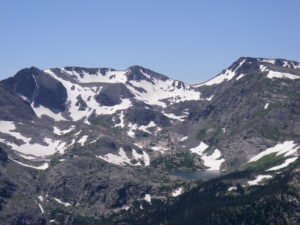 Like I said, I have always been a mountain person. But I don’t think I really knew that until one September day in 2011. I was seven weeks into my 4,000-mile cycling pilgrimage through the West. I had already crossed three major mountain ranges including the Cascades in Oregon and the Rockies twice, once in Montana and once in Colorado. I was nearing the foot of the Sierras after having spent more than one full week crossing the Nevada desert and nearly crushing me psychologically. I had rested for two days in Gardnerville, Nevada before tackling the final mountain range before cycling to the Pacific coast on my way back to Portland.The first few miles paralleled the base of the Sierras as I pedaled along farms with a few cattle, horses, sheep and goats. Eventually the road veered to the right and I was greeted with an increasingly steep road that was snaking its way through a pine-covered forest and alongside a rushing snow-fed stream.I had only pedaled a few strokes when I suddenly exhaled out loud, “I am home. I am home.” My body relaxed. My breathing settled in and I began cranking hard to power my way over the 8,573 foot Kit Carson pass that would point to the Central Valley of California. It was an odd moment. I was at the foot of a major mountain pass where I knew I was going to have to dig deep yet I relaxed as the road began to snake its way up into the stratosphere.
Like I said, I have always been a mountain person. But I don’t think I really knew that until one September day in 2011. I was seven weeks into my 4,000-mile cycling pilgrimage through the West. I had already crossed three major mountain ranges including the Cascades in Oregon and the Rockies twice, once in Montana and once in Colorado. I was nearing the foot of the Sierras after having spent more than one full week crossing the Nevada desert and nearly crushing me psychologically. I had rested for two days in Gardnerville, Nevada before tackling the final mountain range before cycling to the Pacific coast on my way back to Portland.The first few miles paralleled the base of the Sierras as I pedaled along farms with a few cattle, horses, sheep and goats. Eventually the road veered to the right and I was greeted with an increasingly steep road that was snaking its way through a pine-covered forest and alongside a rushing snow-fed stream.I had only pedaled a few strokes when I suddenly exhaled out loud, “I am home. I am home.” My body relaxed. My breathing settled in and I began cranking hard to power my way over the 8,573 foot Kit Carson pass that would point to the Central Valley of California. It was an odd moment. I was at the foot of a major mountain pass where I knew I was going to have to dig deep yet I relaxed as the road began to snake its way up into the stratosphere.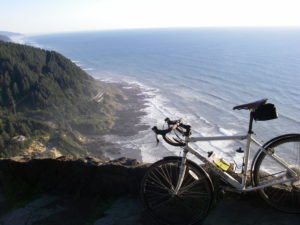 I know now that the mountains and my body and soul belong together. I really confirmed that during my two-year stint in the bucolic little village of Yachats on the Oregon coast. The truth is I had it really good there. Yachats sometimes shows up on the "Top Ten Best Places to Visit in the World" lists. It truly is a magical place. During my second year there I arranged to house sit for a family in exchange for watching over their property while it was for sale. This was a large modern house with picture windows that covered the entire span of the ocean-facing walls. The house was probably forty vertical feet above the ocean and every night I went to sleep with the sound of the waves rhythmically caressing me and the moist ocean air blowing through my window and across my face. And I was enjoying this rent free!Like I said, I had it really good! But given the option between an ocean front home and a cabin in the woods I would choose the latter every time. The ocean was magical. But I know I belong in the mountains.So to the mountains I go again!In September I will leave on another one of my magical adventures--this time to Nepal and Tibet where I and handful of other crazy cyclists will make an ascent in the Himalayas to a spot near Everest Base Camp. Four years ago I made a list of all the possible pilgrimages I might want to tackle. I ended up choosing the route to Rumi's Tomb in Konya, but the Everest Base Camp ascent was high on my list. I vowed it would be near the top next time the itch to travel overwhelmed me.
I know now that the mountains and my body and soul belong together. I really confirmed that during my two-year stint in the bucolic little village of Yachats on the Oregon coast. The truth is I had it really good there. Yachats sometimes shows up on the "Top Ten Best Places to Visit in the World" lists. It truly is a magical place. During my second year there I arranged to house sit for a family in exchange for watching over their property while it was for sale. This was a large modern house with picture windows that covered the entire span of the ocean-facing walls. The house was probably forty vertical feet above the ocean and every night I went to sleep with the sound of the waves rhythmically caressing me and the moist ocean air blowing through my window and across my face. And I was enjoying this rent free!Like I said, I had it really good! But given the option between an ocean front home and a cabin in the woods I would choose the latter every time. The ocean was magical. But I know I belong in the mountains.So to the mountains I go again!In September I will leave on another one of my magical adventures--this time to Nepal and Tibet where I and handful of other crazy cyclists will make an ascent in the Himalayas to a spot near Everest Base Camp. Four years ago I made a list of all the possible pilgrimages I might want to tackle. I ended up choosing the route to Rumi's Tomb in Konya, but the Everest Base Camp ascent was high on my list. I vowed it would be near the top next time the itch to travel overwhelmed me. But there is more to this.I have been a student of religious literature for nearly four decades now. One of the things that shows up consistently is that many of the epiphanies and revelations of religious literature happen on mountains. Moses is given the Ten Commandments on Mt. Sinai. Jesus is transfigured before the disciples' eyes on a mountain. Jesus even preaches a "sermon on the mount" as if his teachings were more likely to take root in the thin air of a mountain than in the bustling commotion of a marketplace.I know that my very first "mystical" experience--where I suddenly got lost in the scenery and couldn't find the line between the observer and the observed--happened on the top of a mountain after cranking my way up it on two wheels. Still to this day the mountains touch me in a place that no other landscape can. When I am in the mountains my lungs expand, my breathing deepens, and my soul exclaims, "You're home, Brian. You're home."As I have done in the past I will invite you into this journey. I am currently pouring over both sacred and secular literature where mountains play a significant and often transformative role. While in Nepal and Tibet I will be living with those texts in my mind and my heart while my legs carry me up the mountains. I will blog as often as Wifi is available in that remote place.Next blog will be a reflection on John Denver's song, Rocky Mountain High. "He was born in the summer of his 27th year..."See you at the top!
But there is more to this.I have been a student of religious literature for nearly four decades now. One of the things that shows up consistently is that many of the epiphanies and revelations of religious literature happen on mountains. Moses is given the Ten Commandments on Mt. Sinai. Jesus is transfigured before the disciples' eyes on a mountain. Jesus even preaches a "sermon on the mount" as if his teachings were more likely to take root in the thin air of a mountain than in the bustling commotion of a marketplace.I know that my very first "mystical" experience--where I suddenly got lost in the scenery and couldn't find the line between the observer and the observed--happened on the top of a mountain after cranking my way up it on two wheels. Still to this day the mountains touch me in a place that no other landscape can. When I am in the mountains my lungs expand, my breathing deepens, and my soul exclaims, "You're home, Brian. You're home."As I have done in the past I will invite you into this journey. I am currently pouring over both sacred and secular literature where mountains play a significant and often transformative role. While in Nepal and Tibet I will be living with those texts in my mind and my heart while my legs carry me up the mountains. I will blog as often as Wifi is available in that remote place.Next blog will be a reflection on John Denver's song, Rocky Mountain High. "He was born in the summer of his 27th year..."See you at the top!
The Culture of Curiosity
Angst. Wrestling. Struggle.For those of you who have read my blog for awhile you will recognize a certain thread of angst that shows up from time to time, usually in waves. If I felt that this was particular only to me I would make sure that my angst was worked out on the therapist's couch and leave you out of my personal dramas. But I am quite convinced that my struggle to find my place in this shifting religious/spiritual realm is not confined to me, but is just a symptom of the deeper and larger issues our religious institutions are facing.It may be just a little more pronounced in me because my livelihood is tied to this. The average parishioner who is lamenting, "I hope my church doesn't go away" is just the tamer version of my lament, "Might my livelihood be in jeopardy?" Almost never are my blogs just playful intellectual exercises. They are efforts to negotiate our way into this emerging new world and to work through where I fit, if I fit and whether there will be any paychecks associated with it when "it" comes. A few days ago I had a breakthrough.Somewhere in the midst of my last two blogs on the deeper meaning of my vertigo attacks and the comments to my blog something broke loose. I think I found the source of this angst, this wrestling and this struggle that keeps surfacing in my writing and my life.I am calling this blog "The Culture of Curiosity." I think it was a combination of two comments, one from Roy and one from Herman, that broke this open for me. Their comments seemed to jar me into finding the source of all this. And I suddenly found myself going all the way back to my days in college taking religion courses.You see, the thing is, I never intended to become a church pastor. In college I worked on a double major. I took a Sports and Fitness Center Management major thinking that I would likely work my way into being the executive director of a YMCA or similar health-centered community center. But I also worked my way through a religion degree simply because I loved the studies so much that I couldn't keep away from it. I took religion for the sheer joy of it and majored in Sports Management as a decent way to make a living.I know people around me saw what I couldn't, but following college I headed off to seminary for a master's in religion. Still, I had no intention of becoming a pastor; I just couldn't curb this deep curiosity I had for religious studies. (I know you are thinking, "He's getting a master's in religion and doesn't want to be a pastor? This dude is a little slow!")
A few days ago I had a breakthrough.Somewhere in the midst of my last two blogs on the deeper meaning of my vertigo attacks and the comments to my blog something broke loose. I think I found the source of this angst, this wrestling and this struggle that keeps surfacing in my writing and my life.I am calling this blog "The Culture of Curiosity." I think it was a combination of two comments, one from Roy and one from Herman, that broke this open for me. Their comments seemed to jar me into finding the source of all this. And I suddenly found myself going all the way back to my days in college taking religion courses.You see, the thing is, I never intended to become a church pastor. In college I worked on a double major. I took a Sports and Fitness Center Management major thinking that I would likely work my way into being the executive director of a YMCA or similar health-centered community center. But I also worked my way through a religion degree simply because I loved the studies so much that I couldn't keep away from it. I took religion for the sheer joy of it and majored in Sports Management as a decent way to make a living.I know people around me saw what I couldn't, but following college I headed off to seminary for a master's in religion. Still, I had no intention of becoming a pastor; I just couldn't curb this deep curiosity I had for religious studies. (I know you are thinking, "He's getting a master's in religion and doesn't want to be a pastor? This dude is a little slow!") It wasn't until I was only fourteen months from graduating that an internship in a church convinced me that being a pastor was the right place for me. Where else could I satisfy this insatiable desire to study religion, dive into the realm of the sacred, and the ponder the role that humans should play in the cosmos.In seminary I took advantage of theology courses with every elective I had. I studied the writings and speeches of Rev. Dr. Martin Luther King, Jr. and Malcolm X. I dove into the theology that emerged from the Holocaust, studying both Jewish literature and Christian literature. I wrote a paper in my Reformed theology class on the "Death of God" theology that emerged in the 60's. And I studied Latin American Liberation Theology that was at the root of confronting political corruption in Central America in the 1980's. In other words, I had all kinds of fun satisfying my theological curiosity.
It wasn't until I was only fourteen months from graduating that an internship in a church convinced me that being a pastor was the right place for me. Where else could I satisfy this insatiable desire to study religion, dive into the realm of the sacred, and the ponder the role that humans should play in the cosmos.In seminary I took advantage of theology courses with every elective I had. I studied the writings and speeches of Rev. Dr. Martin Luther King, Jr. and Malcolm X. I dove into the theology that emerged from the Holocaust, studying both Jewish literature and Christian literature. I wrote a paper in my Reformed theology class on the "Death of God" theology that emerged in the 60's. And I studied Latin American Liberation Theology that was at the root of confronting political corruption in Central America in the 1980's. In other words, I had all kinds of fun satisfying my theological curiosity.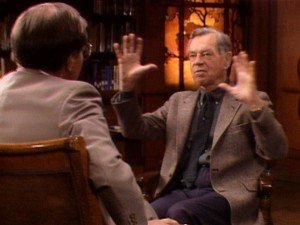 When I graduated personal friends who were just a couple of years ahead of me in seminary gave me a copy of Bill Moyer's Power of Myth, the transcript of his interviews with the famed anthropologist and professor, Joseph Campbell. These friends were my contemporaries and like me they lived in a "culture of curiosity", a culture that many of my Baby Boomer friends also resonated with.I was on a roll. I had bachelor's in religion with honors for my work on "The Protestant Response to the Holocaust." I had a master's degree in religion with an emphasis on theology. I was stretching myself into understanding our Christian tradition through the lens of religious mythology. I was becoming a bit of a theologian in my own right. I was completely in my element.And then something happened. I became a pastor and my culture of curiosity clashed with the culture of church. What had served me so well in college and seminary suddenly unnerved many in my congregations. I remember so very clearly the conversation with a pastor twenty years my senior who cornered me one day with a wrinkled smile on her face saying, "I hear you caused quite a ruckus over at your church this Easter."I said, "Yeah. And the weird thing about it is all I did was preach the stuff we learned in seminary."I will never forget what she said next, "Oh Brian, I know. But you don't bring that stuff into the church."That was the day my world changed and the day that probably serves as the origin of my angst, my wrestling and my struggle. I got into this whole religion business because I found that there was nothing as satisfying as reading, discussing, thinking about, and pondering theology and spirituality. I got into this business because I wanted to be part of an institution charged with asking the big questions of life such as, "Why am I here?" "What is my ultimate purpose in life?" "How ought we to be treating each other?" "What is the nature of life itself?"
When I graduated personal friends who were just a couple of years ahead of me in seminary gave me a copy of Bill Moyer's Power of Myth, the transcript of his interviews with the famed anthropologist and professor, Joseph Campbell. These friends were my contemporaries and like me they lived in a "culture of curiosity", a culture that many of my Baby Boomer friends also resonated with.I was on a roll. I had bachelor's in religion with honors for my work on "The Protestant Response to the Holocaust." I had a master's degree in religion with an emphasis on theology. I was stretching myself into understanding our Christian tradition through the lens of religious mythology. I was becoming a bit of a theologian in my own right. I was completely in my element.And then something happened. I became a pastor and my culture of curiosity clashed with the culture of church. What had served me so well in college and seminary suddenly unnerved many in my congregations. I remember so very clearly the conversation with a pastor twenty years my senior who cornered me one day with a wrinkled smile on her face saying, "I hear you caused quite a ruckus over at your church this Easter."I said, "Yeah. And the weird thing about it is all I did was preach the stuff we learned in seminary."I will never forget what she said next, "Oh Brian, I know. But you don't bring that stuff into the church."That was the day my world changed and the day that probably serves as the origin of my angst, my wrestling and my struggle. I got into this whole religion business because I found that there was nothing as satisfying as reading, discussing, thinking about, and pondering theology and spirituality. I got into this business because I wanted to be part of an institution charged with asking the big questions of life such as, "Why am I here?" "What is my ultimate purpose in life?" "How ought we to be treating each other?" "What is the nature of life itself?"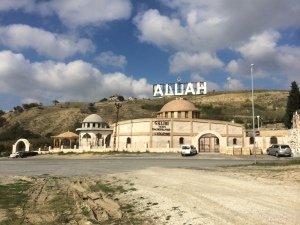 But the deeper I explored those questions the more I felt I was skating on thin ice in the church. I could feel a subtle and not-so-subtle pressure to spend more time reinforcing people's already chosen beliefs rather than venturing into new worlds. My curiosity has led me to Bali where I was able to experience a Hindu "baptism" and rituals of absolving. I powered my way by pedal and two wheels into Muslim Turkey where I shared with brothers and sisters the spiritual discipline of five times a day prayer. In two months I will fly to Nepal and cycle to Everest Base Camp all the while visiting Buddhist temples and monasteries and getting a taste of Buddhist daily life.I have two degrees in religion not because I wanted to be well-prepared to serve as a pastor. No, I have these degrees because I am deeply curious about the religious questions that simmer in the hearts and souls of every human being.This is what makes my heart sing. This is what drove me to spend tens of thousands of dollars on degrees with nary a plan for how I might use it professionally. This curiosity for the religious and soulful impulse of people and cultures is what drives me despite the puzzled I looks I sometimes get from church folks who seem to wonder, "Isn't Jesus enough for you?"My angst is this. By virtue of my age I am part of a culture of curiosity. My Baby Boomer contemporaries aren't just satisfied with the answers that the church gave them as children. They want to know how those answers stack up against the questions of our time that include pondering the truth behind Islam, Buddhism, Hinduism, Judaism, Native American spirituality and a host of other smaller religions and spiritual orientations. They want to know how our tradition is going to face the growing environmental crises that we have brought on ourselves. They want to know if and how our theology confirms the truth of science and whether the two can co-exist in the world in ways that are not mutually exclusive. They want to know if religion can become a force for unity rather than the reason for ongoing division.At their core, they want to know if their theological curiosity will be welcome or a threat.On that issue the jury is still out.
But the deeper I explored those questions the more I felt I was skating on thin ice in the church. I could feel a subtle and not-so-subtle pressure to spend more time reinforcing people's already chosen beliefs rather than venturing into new worlds. My curiosity has led me to Bali where I was able to experience a Hindu "baptism" and rituals of absolving. I powered my way by pedal and two wheels into Muslim Turkey where I shared with brothers and sisters the spiritual discipline of five times a day prayer. In two months I will fly to Nepal and cycle to Everest Base Camp all the while visiting Buddhist temples and monasteries and getting a taste of Buddhist daily life.I have two degrees in religion not because I wanted to be well-prepared to serve as a pastor. No, I have these degrees because I am deeply curious about the religious questions that simmer in the hearts and souls of every human being.This is what makes my heart sing. This is what drove me to spend tens of thousands of dollars on degrees with nary a plan for how I might use it professionally. This curiosity for the religious and soulful impulse of people and cultures is what drives me despite the puzzled I looks I sometimes get from church folks who seem to wonder, "Isn't Jesus enough for you?"My angst is this. By virtue of my age I am part of a culture of curiosity. My Baby Boomer contemporaries aren't just satisfied with the answers that the church gave them as children. They want to know how those answers stack up against the questions of our time that include pondering the truth behind Islam, Buddhism, Hinduism, Judaism, Native American spirituality and a host of other smaller religions and spiritual orientations. They want to know how our tradition is going to face the growing environmental crises that we have brought on ourselves. They want to know if and how our theology confirms the truth of science and whether the two can co-exist in the world in ways that are not mutually exclusive. They want to know if religion can become a force for unity rather than the reason for ongoing division.At their core, they want to know if their theological curiosity will be welcome or a threat.On that issue the jury is still out.
The longing that never goes away...
It was like looking into a mirror that had no smudges and no water spots--a perfect reflection staring back at me. I am almost finished with John O' Donohue's book Eternal Echoes: Exploring Our Yearning to Belong, the book that I have used for my morning meditations for the past few months. Last week I sat down in my man chair with a cup of strong French-press coffee and opened to the short meditation titled, The Artist as Permanent Pilgrim. My eyes grew wider with each sentence. My jaw dropped. This was a personal letter to me. After years of trying to explain how I felt caught between two worlds O' Donohue finally put words to the experience.Here is a short excerpt that was especially powerful and right on:
I am almost finished with John O' Donohue's book Eternal Echoes: Exploring Our Yearning to Belong, the book that I have used for my morning meditations for the past few months. Last week I sat down in my man chair with a cup of strong French-press coffee and opened to the short meditation titled, The Artist as Permanent Pilgrim. My eyes grew wider with each sentence. My jaw dropped. This was a personal letter to me. After years of trying to explain how I felt caught between two worlds O' Donohue finally put words to the experience.Here is a short excerpt that was especially powerful and right on:
"Every artist works from the huge belonging to the tradition, but yet does not repeat anything. The artist belongs in a strange way. He inhabits the tradition to such depth that he can feel it beat in his heart, but his tradition also makes him feel like a total stranger who can find for his longing no echo there. Out of the flow of this intimate foreignness something new begins to emerge."
Wow, John, you really nailed how I have been feeling. This nagging longing and homelessness make sense now. I have spoken often of feeling caught between two worlds and described at times a sort of love/hate relationship with my Christian tradition. Good people in my tradition wonder why I keep searching outside the lines of our tradition. And good friends who don't share my religious tradition wonder what keeps me coming back to it over and over again. O' Donohue nails it when he says that the artist can feel the depth of the tradition beat in his heart and feel like a total stranger to the tradition at the same time.Yes! Yes! Yes! That's it! I wonder if this is how Jesus felt when he said, "I came not to abolish the law and the prophets, but to fulfill them." I wonder if he too was deeply in love with his Jewish tradition and identity and yet, at the same time, felt completely misunderstood and foreign to it also. I wonder if his longing for God represented both the deepest and best part of his tradition and represented how shallow his tradition could often be. I wonder if he felt like a Jewish son and an unknown stranger all at the same time.O' Donohue says that the artist becomes a permanent pilgrim because the longing never goes away until the work is complete. He writes,
I wonder if this is how Jesus felt when he said, "I came not to abolish the law and the prophets, but to fulfill them." I wonder if he too was deeply in love with his Jewish tradition and identity and yet, at the same time, felt completely misunderstood and foreign to it also. I wonder if his longing for God represented both the deepest and best part of his tradition and represented how shallow his tradition could often be. I wonder if he felt like a Jewish son and an unknown stranger all at the same time.O' Donohue says that the artist becomes a permanent pilgrim because the longing never goes away until the work is complete. He writes,
"Each (artist) is haunted by some inner voice that will not permit any contentment until what is demanded is created. The artist cannot settle into the consensus of normal belonging."
Damn! This guy really knows me. And any of you who have gotten to know me over the years probably recognize this as well. "What drives this guy?" "Will he ever settle down?" "I wish he would just learn to be content with something?" "Is nothing ever good enough for him?"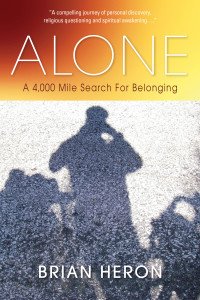 I am so thankful for O' Donohue's words. While I may never feel normal, his words normalized my experience. It makes sense why I continue to dive into the depths of my Christian tradition and feel unbelievably frustrated and disappointed in it at the same time. It makes sense that no matter how many times I go on pilgrimage and stretch a congregation a little more it is never enough. My title Alone: A 4,000 Mile Search for Belonging makes complete sense. Like an artist I have a vision in my head and a longing in my heart and there will be no sigh of relief until the final brushstroke is applied, the last chip of wood is carved out and the final coat of varnish is applied. This piece of art is a lifetime in the making.O' Donohue writes, "The artist is always faithful to longing, first."Truth be told this is my god. Even though I serve the church it is not the church that owns my soul. And even though I am fiercely, annoyingly independent it is not my ego that drives me. Rather it is this longing to hear the echo of an eternal presence and to feel an intimate belonging that transcends this world's definitions. It is to listen for the sacred heartbeat of God and know that my heart too beats in rhythm.O' Donohue said it. The artist is one who lives the longing, worships the longing and follows the longing until the longing is satisfied by the sweet taste of eternity and the enjoyment of divine intimacy. This type of artist is a permanent pilgrim.Will you travel with me?
I am so thankful for O' Donohue's words. While I may never feel normal, his words normalized my experience. It makes sense why I continue to dive into the depths of my Christian tradition and feel unbelievably frustrated and disappointed in it at the same time. It makes sense that no matter how many times I go on pilgrimage and stretch a congregation a little more it is never enough. My title Alone: A 4,000 Mile Search for Belonging makes complete sense. Like an artist I have a vision in my head and a longing in my heart and there will be no sigh of relief until the final brushstroke is applied, the last chip of wood is carved out and the final coat of varnish is applied. This piece of art is a lifetime in the making.O' Donohue writes, "The artist is always faithful to longing, first."Truth be told this is my god. Even though I serve the church it is not the church that owns my soul. And even though I am fiercely, annoyingly independent it is not my ego that drives me. Rather it is this longing to hear the echo of an eternal presence and to feel an intimate belonging that transcends this world's definitions. It is to listen for the sacred heartbeat of God and know that my heart too beats in rhythm.O' Donohue said it. The artist is one who lives the longing, worships the longing and follows the longing until the longing is satisfied by the sweet taste of eternity and the enjoyment of divine intimacy. This type of artist is a permanent pilgrim.Will you travel with me?
When the Terrain Changes #2
"The time has come..." I wrote in my last blog post nearly two weeks ago under the weekly title Mystic Mondays. I certainly didn't mean to convey that I was going away--only that I needed a new title that would fit the evolving content of my posts. I was surprised when I heard from a number of people, "Thank you for being a consistent voice for truth. We'll miss you," or "Where do I go now to follow your writing?"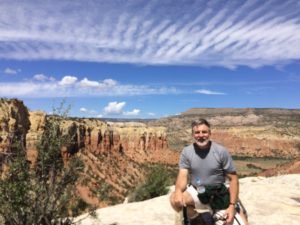 I AM NOT GOING ANYWHERE! I promise.A year ago I wrote under the title Between Two Worlds in what became a daily Lenten devotional as I teased out my own internal struggle of feeling caught between two worlds--an institutional church world that appears to be dissolving away like a sand castle on the beach and an emerging spirituality that does not yet have a consistent set of anchor points. As I emerged from the tunnel of that series I was struck by how often the language and world of religious mysticism showed up in my posts. If the Lenten devotional series was about feeling caught between two worlds the next series was to be an introduction to one world, both ancient and emerging--the world of experiential spirituality, traditionally known as religious mysticism.It felt clear to me. As a pastor in a traditional Christian denomination I could sense this call to walk with congregations in their current state while also introducing them to this new world that I was absolutely convinced represented the future of Christian spiritual community. And for nine months that worked for, sort of.
I AM NOT GOING ANYWHERE! I promise.A year ago I wrote under the title Between Two Worlds in what became a daily Lenten devotional as I teased out my own internal struggle of feeling caught between two worlds--an institutional church world that appears to be dissolving away like a sand castle on the beach and an emerging spirituality that does not yet have a consistent set of anchor points. As I emerged from the tunnel of that series I was struck by how often the language and world of religious mysticism showed up in my posts. If the Lenten devotional series was about feeling caught between two worlds the next series was to be an introduction to one world, both ancient and emerging--the world of experiential spirituality, traditionally known as religious mysticism.It felt clear to me. As a pastor in a traditional Christian denomination I could sense this call to walk with congregations in their current state while also introducing them to this new world that I was absolutely convinced represented the future of Christian spiritual community. And for nine months that worked for, sort of.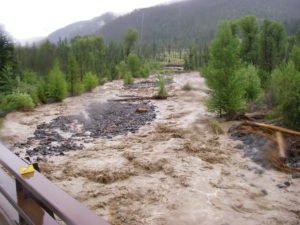 Then something happened! The world that I thought I lived in suddenly disappeared. The political, spiritual, and cultural earthquake we call Trump shook the assumptions that I had been working from. This work of introducing mysticism into our churches and culture was based on a certain amount of stability that I had assumed in our national psyche. My Mystic Monday blog was based on this ongoing assumption that I and we were living "between two worlds" and preparing to enter a new world. I did not account for or anticipate that a third world would suddenly be forced into the conversation that would radically alter my perception of my two world reality.I wrote that "the time has come..." not to inform you that I would no longer write, but that the title "Mystic Monday" had become an awkward and confining title at best. It wasn't quite working post-Trump. Rather than just easing the language of mysticism into our churches and culture I increasingly found my posts pointed directly at Trump or working through my own anger, fear and grief over the sudden loss of that which I considered good and moral and right.I am going to continue to write, but much of it will be simply trying to find my voice again. Somehow Trump has shifted my focus from trying to usher us into a new world to now trying to recover aspects of an old world--so unlike me!
Then something happened! The world that I thought I lived in suddenly disappeared. The political, spiritual, and cultural earthquake we call Trump shook the assumptions that I had been working from. This work of introducing mysticism into our churches and culture was based on a certain amount of stability that I had assumed in our national psyche. My Mystic Monday blog was based on this ongoing assumption that I and we were living "between two worlds" and preparing to enter a new world. I did not account for or anticipate that a third world would suddenly be forced into the conversation that would radically alter my perception of my two world reality.I wrote that "the time has come..." not to inform you that I would no longer write, but that the title "Mystic Monday" had become an awkward and confining title at best. It wasn't quite working post-Trump. Rather than just easing the language of mysticism into our churches and culture I increasingly found my posts pointed directly at Trump or working through my own anger, fear and grief over the sudden loss of that which I considered good and moral and right.I am going to continue to write, but much of it will be simply trying to find my voice again. Somehow Trump has shifted my focus from trying to usher us into a new world to now trying to recover aspects of an old world--so unlike me!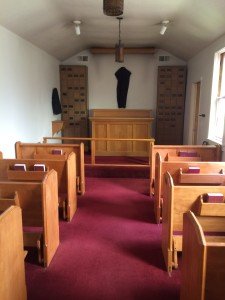 Strangely enough my Mystic Monday posts were to provide a relevant and fresh avenue in a world where the pulpit seems to have lost much of its relevance. But now that assumption has been challenged. Now I wonder if the traditional pulpit needs to be resurrected. We need recognized places where the moral and spiritual voice of the community can speak "truth to power" as has become popular. Now instead of the church needing to learn how to cross the bridge into a new world, I wonder now if they need to gather up their moral courage and restore their former prophetic voice.The world changed in recent months. I no longer feel like I am between two worlds. Now I feel like I was suddenly dropped into an alien world--a world that my religious tradition names as evil, inhumane, cruel and an offense to the God who flows through my mystical core. I am trying to hang on to the shreds of my old worldThe time has come--not to disappear--but to find once again that voice that is honest, vulnerable, truthful, courageous and hopeful. The time has come to speak to and in the context of a Trump world.I am not going anywhere. I am only trying to find my voice in this new terrain. Will you join me as we remind ourselves of what is true, recommit ourselves to that which is good, and fight to hold onto a world where kindness, honesty, and humility were strengths, not liabilities.
Strangely enough my Mystic Monday posts were to provide a relevant and fresh avenue in a world where the pulpit seems to have lost much of its relevance. But now that assumption has been challenged. Now I wonder if the traditional pulpit needs to be resurrected. We need recognized places where the moral and spiritual voice of the community can speak "truth to power" as has become popular. Now instead of the church needing to learn how to cross the bridge into a new world, I wonder now if they need to gather up their moral courage and restore their former prophetic voice.The world changed in recent months. I no longer feel like I am between two worlds. Now I feel like I was suddenly dropped into an alien world--a world that my religious tradition names as evil, inhumane, cruel and an offense to the God who flows through my mystical core. I am trying to hang on to the shreds of my old worldThe time has come--not to disappear--but to find once again that voice that is honest, vulnerable, truthful, courageous and hopeful. The time has come to speak to and in the context of a Trump world.I am not going anywhere. I am only trying to find my voice in this new terrain. Will you join me as we remind ourselves of what is true, recommit ourselves to that which is good, and fight to hold onto a world where kindness, honesty, and humility were strengths, not liabilities.
The Unparalleled Christmas "Myth"
Mystic Mondays December 19, 2016I will admit that my first attempt at a post this week was titled Dear Donny as you-know-who got under my skin again. But I just couldn't go there. For the moment I am tired of being angry. My soul needs a break.With Christmas just around the corner I decided to pull out the very first newspaper article I ever wrote back on December 17, 1993. This article really became the catalyst for much of my life--it ignited a great conversation and a six-month long controversy in a northern California community. Eventually a new church was formed from the energy and interest that this article and others later produced. And my eventual interest in religious mysticism has its basis in my early introduction to mythology.This is my Christmas gift to you!THE CHRISTMAS MYTH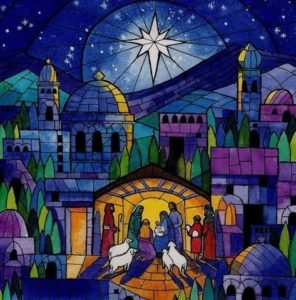 Fiction or non-fiction? Truth or lie? Historical fact or just a myth?Here we are at Christmas time where much of the community, church folk and non-church folk alike, will celebrate the birth of Jesus. And more importantly, we celebrate "the incarnation of God," which is just a fancy way of saying "God became flesh."In recent years I have heard numerous discussions around the historical accuracy of the Bible including the Christmas story. The discussions often revolve around the events which we might consider supernatural."Was Mary really a virgin when she conceived Jesus?" "Did an angel really appear to the shepherds to tell them of Jesus' birth?" "Was Jesus really both a person and God, both human and divine?"Historical fact or just a myth? To the modern mind this question seems pressing. To a society which measures truth by scientific instruments this question begs for a straight answer. We want to know, "Is it fiction or non-fiction, truth or lie, historical fact or just a myth?"Those who can't swallow that the events surrounding Jesus' birth are historically accurate sometimes say, "Oh, the whole Christmas story is just a myth." This is a statement to which I must agree. However, I would say, "It is not JUST a myth. Rather, it is NO LESS than a myth."
Fiction or non-fiction? Truth or lie? Historical fact or just a myth?Here we are at Christmas time where much of the community, church folk and non-church folk alike, will celebrate the birth of Jesus. And more importantly, we celebrate "the incarnation of God," which is just a fancy way of saying "God became flesh."In recent years I have heard numerous discussions around the historical accuracy of the Bible including the Christmas story. The discussions often revolve around the events which we might consider supernatural."Was Mary really a virgin when she conceived Jesus?" "Did an angel really appear to the shepherds to tell them of Jesus' birth?" "Was Jesus really both a person and God, both human and divine?"Historical fact or just a myth? To the modern mind this question seems pressing. To a society which measures truth by scientific instruments this question begs for a straight answer. We want to know, "Is it fiction or non-fiction, truth or lie, historical fact or just a myth?"Those who can't swallow that the events surrounding Jesus' birth are historically accurate sometimes say, "Oh, the whole Christmas story is just a myth." This is a statement to which I must agree. However, I would say, "It is not JUST a myth. Rather, it is NO LESS than a myth." Myths are one of those powerful and profound realities that help shape and give meaning to the experiences of life. Much of the Bible is myth. Which means that it may not be true in an historical or scientific sense. But its truth lies in deeper places, more sacred than instruments can touch.Joseph Campbell, considered the world's leading mythologist, says this: "Mythology is not a lie, mythology is poetry, it is metaphorical. It has been well said that mythology is the penultimate truth--penultimate because the ultimate cannot be put into words. It is beyond words, beyond images...Mythology pitches the mind...to what can be known but not told. So this is the penultimate truth." (The Power of Myth, 1988)In other words, myths point us to the ultimate truth--a truth which lies beyond any story or historical event. We don't believe the Christmas story is true because someone found evidence that Mary really was a virgin, or because it was proven that God really did descend and become human in Jesus. We believe the Christmas story is true because it points to the ultimate truth--a truth we feel and know, but can only express through mythic stories.
Myths are one of those powerful and profound realities that help shape and give meaning to the experiences of life. Much of the Bible is myth. Which means that it may not be true in an historical or scientific sense. But its truth lies in deeper places, more sacred than instruments can touch.Joseph Campbell, considered the world's leading mythologist, says this: "Mythology is not a lie, mythology is poetry, it is metaphorical. It has been well said that mythology is the penultimate truth--penultimate because the ultimate cannot be put into words. It is beyond words, beyond images...Mythology pitches the mind...to what can be known but not told. So this is the penultimate truth." (The Power of Myth, 1988)In other words, myths point us to the ultimate truth--a truth which lies beyond any story or historical event. We don't believe the Christmas story is true because someone found evidence that Mary really was a virgin, or because it was proven that God really did descend and become human in Jesus. We believe the Christmas story is true because it points to the ultimate truth--a truth we feel and know, but can only express through mythic stories.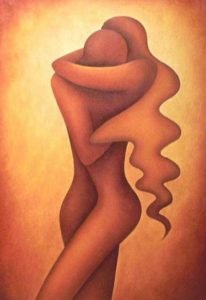 We believe the Christmas myth because it unveils the beautiful dance between the human and her partner, the divine, in each of our lives. We believe the Christmas myth because it reveals the spiritual nature of all births and new beginnings. We believe the Christmas myth because it teaches us about the nature of our lives. It teaches us that God and flesh are not separate and, in fact, are tightly intertwined in such a way that we are "fully human, fully divine."It doesn't matter whether the events surrounding Jesus' birth happened exactly as they are portrayed. All that matters is whether you feel more alive and compassionate when you read it. All that matters is whether it puts you in touch with the human/divine dance playing within you. If it does that then this myth holds more truth than any historical event will ever hold.The Christmas story is not JUST a myth. It is NO LESS than a myth.
We believe the Christmas myth because it unveils the beautiful dance between the human and her partner, the divine, in each of our lives. We believe the Christmas myth because it reveals the spiritual nature of all births and new beginnings. We believe the Christmas myth because it teaches us about the nature of our lives. It teaches us that God and flesh are not separate and, in fact, are tightly intertwined in such a way that we are "fully human, fully divine."It doesn't matter whether the events surrounding Jesus' birth happened exactly as they are portrayed. All that matters is whether you feel more alive and compassionate when you read it. All that matters is whether it puts you in touch with the human/divine dance playing within you. If it does that then this myth holds more truth than any historical event will ever hold.The Christmas story is not JUST a myth. It is NO LESS than a myth.
I Was Once a Stranger...
Mystic Mondays December 12, 2016Dear Readers,The following post is an edited version of a blog post that I written while on my Rome to Rumi pilgrimage in the fall of 2014 just as the political environment was becoming fragile and dangerous in Turkey. Because of recent events regarding the treatment of American Muslims and an intention to dive into my From Rome to Rumi book I have decided to reprint this edited version.Here it is:I woke up in Kesan for my first full day in Turkey after cycling 1,500 miles through Italy and Greece. While eating breakfast the news on the screen above me didn’t look good. German shepherds, tear gas, armored tanks and vandalized storefronts and vehicles filled the screen. I had pedaled my way right into a political crisis. ISIS was attacking the Kurds just over the southern border. The Turkish government was slow to respond and the Turkish people were letting their displeasure be known.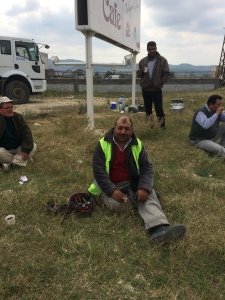 I was in a foreign land. Didn’t speak a word of Turkish and had no idea of how Turkish Muslims would react to an American clad in funny spandex clothing riding through their country at the height of political unrest. I was soon to find out. I hadn’t traveled more than fifteen kilometers when a man with a bald head started gesturing my way with a large loaf of bread. He was inviting me to join him and his road crew for lunch.I wasn’t hungry, but I wasn’t going to pass up this opportunity nor take the risk of offending my new Turkish hosts. I was given a large tray filled with lentil soup, rice, some sort of meatballs and a half loaf of bread. I picked away at the items eating the most easily digestible items first. I didn’t want to stuff myself and find myself vomiting down the road later.Next came an awkward dance. I couldn’t finish my meal, but it was also clear that I hadn’t eaten enough to satisfy some unspoken rule that I could feel in the air. The man to the left of me clearly expected me to eat everything that was put in front of me. The man to the right, who had first waved me over, was trying to guide me through the meal. Finally the message became clear—I could leave everything on my tray except for the meatballs. Those could not be wasted.As soon as I finished the last meatball the man to the right snatched up my tray and shoveled the rest of the food off into the grass. Then he pointed to a herd of goats nearby and gestured between them and his mouth. They had killed a goat for this meal. Cultural and religious protocol demanded that all of it be eaten. The sacrifice of an animal was to not be treated lightly.
I was in a foreign land. Didn’t speak a word of Turkish and had no idea of how Turkish Muslims would react to an American clad in funny spandex clothing riding through their country at the height of political unrest. I was soon to find out. I hadn’t traveled more than fifteen kilometers when a man with a bald head started gesturing my way with a large loaf of bread. He was inviting me to join him and his road crew for lunch.I wasn’t hungry, but I wasn’t going to pass up this opportunity nor take the risk of offending my new Turkish hosts. I was given a large tray filled with lentil soup, rice, some sort of meatballs and a half loaf of bread. I picked away at the items eating the most easily digestible items first. I didn’t want to stuff myself and find myself vomiting down the road later.Next came an awkward dance. I couldn’t finish my meal, but it was also clear that I hadn’t eaten enough to satisfy some unspoken rule that I could feel in the air. The man to the left of me clearly expected me to eat everything that was put in front of me. The man to the right, who had first waved me over, was trying to guide me through the meal. Finally the message became clear—I could leave everything on my tray except for the meatballs. Those could not be wasted.As soon as I finished the last meatball the man to the right snatched up my tray and shoveled the rest of the food off into the grass. Then he pointed to a herd of goats nearby and gestured between them and his mouth. They had killed a goat for this meal. Cultural and religious protocol demanded that all of it be eaten. The sacrifice of an animal was to not be treated lightly.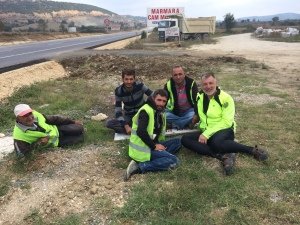 Only later did I discover that what I had been invited into was a celebration of Eid al Adha, “The Festival of Sacrifice” one of two high holy days on the Muslim calendar. One aspect of the celebration is that one-third of the sacrificed goat must go to the stranger, the pilgrim, and the needy. I just happened to come by at the right moment and I was the stranger who took my place in the unfolding drama of this holy celebration. When we parted we shared a deep embrace and the double kiss that is custom in the East. I was a welcome guest in this foreign country.I share this today because in recent weeks we have heard that mosques are being threatened with violence and American Muslims are being targeted for harassment and even hate crimes. It is hard to imagine the Muslim brothers I met that day deserving such treatment and vitriol. They were just the opposite of the stereotypes we have concocted.What I experienced that first day in riding into Turkey became the pattern for the next three weeks as I cycled into the heart of Turkey. I was repeatedly invited to share tea with shop owners and random people I had met. I was welcomed into mosques to pray without any hesitation or wariness on their part.“Welcoming the stranger” is a way of life for the vast majority of Muslims. It’s a cultural expectation and a religious responsibility. I will forever remember my three weeks of being welcomed by Muslim brothers and sisters in Turkey in the middle of a political crisis.Now it’s our turn. Let’s return the favor.
Only later did I discover that what I had been invited into was a celebration of Eid al Adha, “The Festival of Sacrifice” one of two high holy days on the Muslim calendar. One aspect of the celebration is that one-third of the sacrificed goat must go to the stranger, the pilgrim, and the needy. I just happened to come by at the right moment and I was the stranger who took my place in the unfolding drama of this holy celebration. When we parted we shared a deep embrace and the double kiss that is custom in the East. I was a welcome guest in this foreign country.I share this today because in recent weeks we have heard that mosques are being threatened with violence and American Muslims are being targeted for harassment and even hate crimes. It is hard to imagine the Muslim brothers I met that day deserving such treatment and vitriol. They were just the opposite of the stereotypes we have concocted.What I experienced that first day in riding into Turkey became the pattern for the next three weeks as I cycled into the heart of Turkey. I was repeatedly invited to share tea with shop owners and random people I had met. I was welcomed into mosques to pray without any hesitation or wariness on their part.“Welcoming the stranger” is a way of life for the vast majority of Muslims. It’s a cultural expectation and a religious responsibility. I will forever remember my three weeks of being welcomed by Muslim brothers and sisters in Turkey in the middle of a political crisis.Now it’s our turn. Let’s return the favor.

